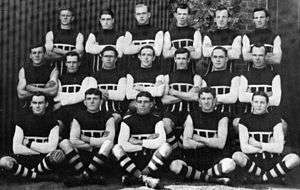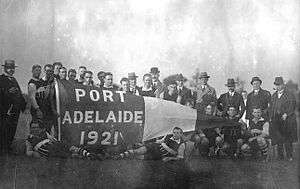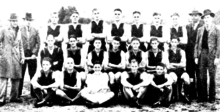Harold Oliver (Australian footballer)
| Harold Oliver | |||
|---|---|---|---|
 | |||
| Personal information | |||
| Full name | William Harold Oliver | ||
| Date of birth | 12 August 1891 | ||
| Place of birth | Waukaringa, South Australia | ||
| Date of death | 15 November 1958 (aged 67) | ||
| Place of death | Adelaide, South Australia | ||
| Original team(s) |
South Broken Hill (1908) Lyrup (1909) West Suburbans (1910) | ||
| Height / weight | 83 kilograms (183 lb)[1] | ||
| Position(s) | Utility | ||
| Playing career1 | |||
| Years | Club | Games (Goals) | |
| 1910–1922 | Port Adelaide | 117 (89) | |
| Representative team honours | |||
| Years | Team | Games (Goals) | |
| 1911–1912, 1921 | South Australia | 14 (15)[2] | |
|
1 Playing statistics correct to the end of 1922. | |||
| Career highlights | |||
| |||
William Harold Oliver (12 August 1891 – 15 November 1958) was an Australian rules footballer. He was the son of Cornish immigrant parents James Oliver and Sarah Mill.[4] Harold Oliver was a key player to some of South Australian football's most successful teams. He starred in South Australia's victorious 1911 Australian football championship along with Port Adelaide's 1914 "Invincible's" team. After being close to retiring from the game after World War I he returned to captain Port Adelaide to the 1921 SAFL premiership.[5][6]
His reputation as an early exponent of the spectacular mark along with his general skill at playing the game saw him regarded as one of the best players South Australia has produced. This is despite never having won the Magarey Medal, somewhat a result of his career being interrupted by World War I.[7]
Early life (1891–1895)
Harold Oliver was born to Cornish immigrants James Oliver and Sarah Mill in the gold mining town of Waukaringa. It was common for Cornish people, where mining was a key industry, to move to Australia and use their knowledge to attempt a better life as the economy in Cornwall was waining.[8] During Oliver's childhood in the 1890s the town was home to 600 people. Today it is a ghost town.[9]
Broken Hill years (1896–1908)
When Harold Oliver was five his family moved to Broken Hill, New South Wales. This is where he started playing junior football and in his last year in Broken Hill he debuted for South Broken Hill in the Broken Hill Football League at the age of 17.[10]
Lyrup Football Club (1909)
In 1909 Harold Oliver moved to Lyrup, South Australia and started a farm growing fruit. During this time, he captained the Lyrup football team. In 1909, after never previously winning a game, the Lyrup football club won the local riverland league premiership.[10] They subsequently traveled to Mildura where they lost twice to the home team. The Mildura Cultivator praised Oliver's marking and kicking reporting that it was as good as anyone who had played at the ground.[11] An umpire at the game from Melbourne told Harold that he would be welcome in Melbourne to play football if he wanted to.[12] At the end of 1909 Oliver was contemplating moving to Queensland to join his sister in the state but two friends, the Musgrave brothers, who played for West Suburbans in Adelaide suggested he come down and visit.[10]
Port Adelaide Football Club (1910–1922)
When Oliver arrived in Adelaide he started playing for West Suburbans and immediately began to draw attention from the two largest South Australian Football League (SAFL) clubs, Norwood and Port Adelaide. South Australian businessman Edwin T. Smith was sending Oliver letters asking him to come train with Norwood whilst John Woolard, captain of Port Adelaide and also of Broken Hill, was asking the same thing.[10] Before Oliver made his debut with Port Adelaide he was lined up with a job shovelling furnace waste. Disgruntled, he spoke to the Musgrave brothers father who suggested he approach West Torrens and train with them, to which Oliver agreed.[10] Port Adelaide secretary James Hodge prevented this move as Oliver had signed a contract with him shortly beforehand.[13] Hodge later took Oliver out on a fishing trip to resolve the feud and found him a better job.[10]
Harold Oliver made his senior debut for Port Adelaide on the 25th June 1910 in a win against North Adelaide at Jubilee Oval.[10] During the 1910 Championship of Australia match against Victorian Football League (VFL) premiers Collingwood Harold Oliver kicked 5 goals helping Port Adelaide achieve the win.[14] In 1910 Oliver also made the journey with Port Adelaide to Western Australia to play a series of matches. This was the first trip by an eastern state club to play football in Western Australia.[10] Harold Oliver was awarded a gold medal by Port Adelaide for being the best junior of the 1910 season for the club.[3]
Oliver is one of the youngest and, so far as the 1911 season is concerned, has been the most brilliant exponent of all the players in senior football. He is only 20 years of age, and, although he entered the arena as an inexperienced junior last year, he has made remarkable headway to pride of place which The Register unhesitatingly gives to him this year. He holds his own with the best of the more experience exponents of the game, and taking into consideration his age and experience, he is well entitled to the (Magarey) medal. He is a fine type of athlete and possesses all the qualities for a successful and leading footballer for years to come.
The Adelaide Register[15]
Harold Oliver was a member of the South Australian state team that won the 1911 Interstate Carnival defeating the Victorian side 11.11 (77) to 5.4 (34). Players in the 1911 South Australian team included Bert Renfrey (captain), Vic Cumberland, Richard Head, Tom Leahy, Dave Low along with Port Adelaide players Sampson Hosking, Angelo Congear and Frank Hansen.[16] At the end of the 1911 SAFL season Harold Oliver was awarded his first Port Adelaide Best and Fairest in just his second year at the club.
He kicked 28 goals in the 1912 SAFL season.[17] At the end of the 1912 SAFL season he would be awarded his second consecutive Port Adelaide Best and Fairest.
In 1913 Port Adelaide won the 1913 SAFL premiership and the 1913 Championship of Australia by defeating VFL premier Fitzroy.
In 1914 Harold Oliver played every game for the year.[18] He was part of Port Adelaide's undefeated 1914 team that defeated VFL premiers Carlton in the 1914 Championship of Australia match at the Adelaide Oval. A game played between Port Adelaide and a composite team of the SAFL was played in 1914 with Port Adelaide coming out as the victors and Harold Oliver awarded the best on ground with arguably the best players of the competition taking to the field on that day.[19]



War years in Berri (1916–1919)
During World War I Harold Oliver returned to Berri to maintain his farm. One of his close friends William Powell sent him a letter during his time serving that included a short paragraph describing how Australian soldiers were discussing his prowess and that others were exclaiming "OLIVER" whilst playing the Australian game.
There is one thing Harold that I must mention to you right here and it is something which ought to make you and Mrs Oliver and also little Miss Oliver phoned [sic] and it is this that since leaving Dear old Australia I have heard your name and fame discussed in three different countries namely Egypt, Lemnos Island (Greece) and at the front offensive in the ferocity line even amid the din of battle when bullets bombs and shrapnel were dealing both death and destruction on all sides I have oft times heard your fame discussed in arguments about football and I remember as we were travelling from Port Suez to Cairo going through the valley of the Nile by train we passed some Indians who are stationed there, playing football and as the ball was up in the air someone on our train yelled out the old famous battle cry Oliver. I can tell you Harold it sent a thrill of pleasure right through me to hear the good old name and know that others besides myself had not forgotten you.
Corporal William J Powell[20]
After World War I Harold Oliver was close to retiring from league football playing only 1 game in 1919.
Return to Port Adelaide and captaincy (1920–1922)


In 1920 keen supporters of the Port Adelaide Football Club, headed by Mr. Swain, collectively raised £77.13.8[22] and bought Harold a Rover 3.5hp motor-cycle[21] so he could make his commute of over 200 km to and from Berri where he eventually settled on his own property as a fruit grower during the 1920 season.[12] During the 1921 season, which he served as club captain, he led the club to the SAFL premiership, winning his fourth in the process.
In 1922 after playing only 5 league matches for the season his career at Port Adelaide finally came to an end due to commitments to his farm at Berri and disputes regarding game compensation. His contract termination meant he was paid ₤76 of ₤100 pounds for the season.[23]
Return to Riverland football (1923–1932)

When Harold Oliver retired from league football he returned to the South Australian Riverland to settle in Berri. He became captain-coach of the Berri Football Club in 1923.[24] Berri Football Club replanted a new oval in 1927 and Harold Oliver worked as a groundskeeper.[25] In 1929 at the age of 38 he had kicked 21 goals from the opening three games for the Upper Murray Association football team and averaged more than 10 goals at the clubs Berri home ground for the season.[26] He played his last ever football game in 1931 when his club won the Upper Murray Association premiership defeating Barmera.[27] During the match he kicked six goals from six shots at goal.[28] Oliver coached Berri to premierships in 1937 and 1938. During the 1938 post season Oliver organised an exhibition match between Berri and his old club Port Adelaide.[29]
Personal life
Harold Oliver married a Mrs Downer of Lyrup on the 19th of July, 1914.[30] They had one child Beryl.
He died on the 15 November 1958 aged 67. The only club representatives at his funeral were Bob McLean and Charles Darwent leading to the former to say in his book '100 Years with the Magpies' that "There is a very true saying, when referring to the champions, that they are peacock's feathers today and feather dusters tomorrow ... How the mighty fall!".[31]
Reputation
Harold Oliver is often considered one of the best South Australian players never to win the Magarey Medal.[7] This is partially the result of the medal not being awarded for several years during World War I while the SAFL competition was suspended.
Charlie Checkett, long serving curator of the Adelaide Oval considered Harold Oliver "The greatest footballer this state [South Australia] has produced".[32]
Vic Richardson, captain of the Sturt Football Club and Australian cricket team described Harold Oliver as being "The finest all-round exponent of Australian football in my playing and watching experience of it". [33]
Phil Matson, East Perth premiership player and coach, regarded Harold Oliver as the best centre man he had met during his football career.[34]
Angelo Congear, whose career completely overlapped with Oliver, said that "As an all-roundplayer, Harold Oliver is my pick. In his prime he played a wonderfully clever game anywhere. He is also the fairest player it has been my pleasure to play with."[35]
Tom Leahy, Magarey Medalist and captain of North Adelaide, once stated after a game at Alberton Oval that "North Adelaide would certainly have won had Port not possessed a superman in Oliver."[36]
Within South Australia at the time he was unanimously considered the best exponent of the spectacular high flying mark.[37]
In 2001 Harold Oliver was named in the Port Adelaide Football Club's greatest team on the Half Forward Flank.[38]
References
- ↑ "PLAY AND PLAYERS.". Daily Herald (Adelaide, SA : 1910 - 1924). Adelaide, SA: National Library of Australia. 4 August 1922. p. 7. Retrieved 17 October 2015.
- ↑ Port Adelaide Football Club Yearbook 2014
- 1 2 "HAROLD OLIVER". Murray Pioneer And Australian River Record. 33, (27). South Australia. 27 June 1925. p. 1. Retrieved 12 November 2016 – via National Library of Australia.
- ↑ "RootsWeb's WorldConnect Project: South Australian people". wc.rootsweb.ancestry.com. Retrieved 2015-07-13.
- ↑ "W (Harold) Oliver". SANFL.
- ↑ "Harold Oliver". Australian Football.com.
- 1 2 "Australian Football - Harold Oliver - Player Bio". australianfootball.com. Retrieved 2015-10-16.
- ↑ "Historical recognition for South Australian mining". Australian Mining. Retrieved 2016-03-31.
- ↑ "Ghost Towns of Australia". www.oocities.org. Retrieved 2015-07-13.
- 1 2 3 4 5 6 7 8 "'Olivah-h-h-h'—High-Flying Port Adelaide Champion". News. 47, (7,225). South Australia. 28 September 1946. p. 5. Retrieved 7 November 2016 – via National Library of Australia.
- ↑ "PASTIME.". The Mildura Cultivator (Vic. : 1888 - 1920). Vic.: National Library of Australia. 14 August 1909. p. 8. Retrieved 22 October 2015.
- 1 2 "Family tree. Details of William Harold OLIVER (1891–1958)". www.users.on.net. Retrieved 2015-10-16.
- ↑ "NEWS AND NOTES.". Evening Journal. XLIV, (12206). South Australia. 19 May 1910. p. 4 (SPECIAL SPORTS EDITION). Retrieved 8 November 2016 – via National Library of Australia.
- ↑ "FOOTBALL CHAMPIONSHIP.". The Advertiser (Adelaide, SA : 1889 - 1931). Adelaide, SA: National Library of Australia. 17 October 1910. p. 12. Retrieved 17 October 2015.
- ↑ Rucci, Michelangelo (8 May 2015). "How soon we forget the stars of yesteryear" – via The Advertiser.
- ↑ "The South Australian team". The Advertiser (Adelaide, SA). 5 August 1911. p. 17.
- ↑ "FOOTBALL. PORT ADELAIDE CLUB.". Daily Herald. 1912-03-09. p. 12. Retrieved 2015-10-16.
- ↑ "Australian Football". australianfootball.com. Retrieved 2015-10-16.
- ↑ "FOOTBALL.". Observer (Adelaide newspaper). Adelaide, SA: National Library of Australia. 17 October 1914. p. 33. Retrieved 21 December 2014.
- ↑ "A letter from Corporal William J Powell". www.murraypioneer.com.au. Retrieved 2015-10-17.
- 1 2 "Motoring.". Observer. LXXVII, (5,816). South Australia. 10 July 1920. p. 14. Retrieved 23 September 2016 – via National Library of Australia.
- ↑ McLean, Robert (1971). 100 Years with the Magpies. Adelaide: Letterpress. p. 23.
- ↑ "PLAY AND PLAYERS NOTES FROM VARIOUS SOURCES.". Daily Herald. 1922-08-04. p. 7. Retrieved 2015-10-16.
- ↑ "PORT". News. VI, (824). South Australia. 4 March 1926. p. 11 (HOME EDITION). Retrieved 31 October 2016 – via National Library of Australia.
- ↑ "FOOTBALL VETERAN". News. XIII, (1,928). South Australia. 19 September 1929. p. 4 (HOME EDITION). Retrieved 31 October 2016 – via National Library of Australia.
- ↑ "FOOTBALL VETERAN HAROLD OLIVER IN FORM Former Port Captain". News. 1929-09-19. p. 4. Retrieved 2015-10-16.
- ↑ "HAROLD OLIVER'S LAST GAME.". The Advertiser (Adelaide, SA : 1931 - 1954). Adelaide, SA: National Library of Australia. 9 October 1931. p. 9. Retrieved 18 November 2014.
- ↑ "NOTES ON THE GAME.". Advertiser and Register (Adelaide, SA : 1931). Adelaide, SA: National Library of Australia. 4 September 1931. p. 5. Retrieved 22 October 2015.
- ↑ "Random Notes on U.M. Football.". Murray Pioneer and Australian River Record (Renmark, SA : 1913 - 1942). Renmark, SA: National Library of Australia. 22 September 1938. p. 10. Retrieved 22 October 2015.
- ↑ "WEDDING AT LYRUP. OLIVER—DOWNER.". Murray Pioneer and Australian River Record. 1913-08-01. p. 6. Retrieved 2015-10-16.
- ↑ McLean, Robert (1971). 100 Years with the Magpies. Adelaide: Letterpress. pp. 17–18.
- ↑ "GENERAL NOTES.". Daily Herald (Adelaide, SA : 1910 - 1924). Adelaide, SA: National Library of Australia. 30 May 1919. p. 7. Retrieved 28 December 2014.
- ↑ "Australian Football - Harold Oliver - Player Bio". australianfootball.com. Retrieved 2015-10-17.
- ↑ Soda, Programmable. "Australian Football - phil matson is remembered". australianfootball.com. Retrieved 2016-10-22.
- ↑ "A. CONGEAR". Critic. XXXI, (1228). South Australia. 7 September 1921. p. 23. Retrieved 7 November 2016 – via National Library of Australia.
- ↑ "HAROLD OLIVER, SUPERFOOTBALLER. His Extraordinary Career.". The Express. LX, (17,981). South Australia. 5 July 1923. p. 7 (5 O'CLOCK EDITION. SPORTS NUMBER). Retrieved 12 November 2016 – via National Library of Australia.
- ↑ "O-L-I-V-E-R! Marking Controversy WAS HE HIGHEST FLYER?". News. 1927-06-09. p. 14. Retrieved 2015-10-16.
- ↑ "Greatest Team - portadelaidefc.com.au". portadelaidefc.com.au. Retrieved 2015-10-16.
External links
- South Australian Football Hall of Fame - Harold Oliver
- australianfootball.com - Harold Oliver player profile